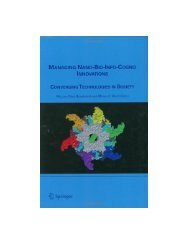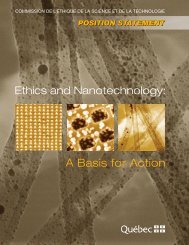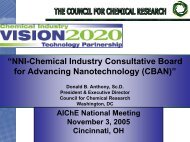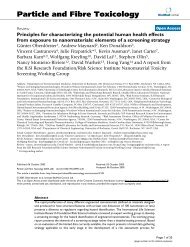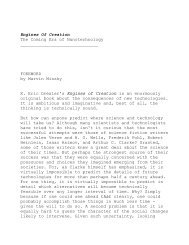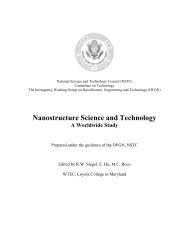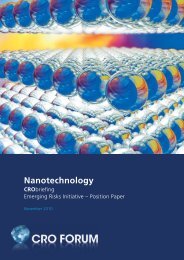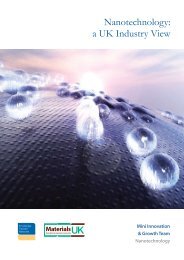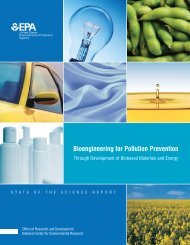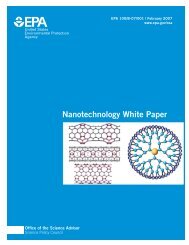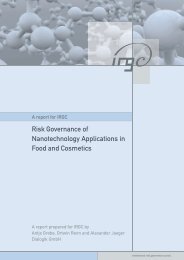Global Dialogue on Nanotechnology and the Poor ... - Nanowerk
Global Dialogue on Nanotechnology and the Poor ... - Nanowerk
Global Dialogue on Nanotechnology and the Poor ... - Nanowerk
You also want an ePaper? Increase the reach of your titles
YUMPU automatically turns print PDFs into web optimized ePapers that Google loves.
nanotechnology,<br />
water, & development<br />
[5] c<strong>on</strong>clusi<strong>on</strong><br />
Lack of access to clean water <strong>and</strong> basic sanitati<strong>on</strong> is affecting milli<strong>on</strong>s<br />
of people around <strong>the</strong> world.The well-documented ec<strong>on</strong>omic, social,<br />
<strong>and</strong> envir<strong>on</strong>mental challenges resulting from <strong>the</strong> lack of access to<br />
clean water <strong>and</strong> basic sanitati<strong>on</strong> have inspired many activities aimed<br />
at addressing <strong>the</strong>se problems. <strong>Nanotechnology</strong>-based water<br />
treatment devices are already available <strong>and</strong> many more are likely<br />
to come <strong>on</strong> <strong>the</strong> market in <strong>the</strong> coming years. Due to <strong>the</strong> pressing<br />
human development needs <strong>and</strong> <strong>the</strong> availability of promising new<br />
technologies, many people have identified nanotechnology for water<br />
purificati<strong>on</strong> as a high priority area for fur<strong>the</strong>r acti<strong>on</strong>.<br />
The paper dem<strong>on</strong>strates that nanotechnology research is being<br />
c<strong>on</strong>ducted in a broad spectrum of areas relevant to water treatment<br />
– filters, catalysts, magnetic nanoparticles, <strong>and</strong> sensors. However, <strong>the</strong><br />
maturity of research <strong>and</strong> development efforts is uneven across <strong>the</strong>se<br />
areas, with nanofiltrati<strong>on</strong> currently appearing as <strong>the</strong> most mature.<br />
Interest in <strong>the</strong> applicati<strong>on</strong> of nanotechnology to water treatment<br />
devices appears to be driven by several factors including, but not<br />
limited to, reduced costs, improved ability to selectively remove<br />
c<strong>on</strong>taminants, durability, <strong>and</strong> size of device. While <strong>the</strong> current<br />
generati<strong>on</strong> of nanofilters may be relatively simple, many researchers<br />
believe that future generati<strong>on</strong>s of nano-based water treatment<br />
devices will capitalize <strong>on</strong> <strong>the</strong> new properties of nanoscale materials.<br />
Advances through nanotechnology, <strong>the</strong>refore, may prove to be of<br />
significant interest to both developed <strong>and</strong> developing countries.<br />
As <strong>the</strong> South African case study illustrates, water treatment devices<br />
incorporating nanotechnology may be more mature than many<br />
people assume; <strong>the</strong>y are already being used. It also dem<strong>on</strong>strates<br />
that nanotechnology projects are being initiated <strong>and</strong> implemented<br />
by developing countries; <strong>the</strong> use of <strong>the</strong>se technologies is not limited<br />
<strong>on</strong>ly to developed countries. Fur<strong>the</strong>rmore, while many developing<br />
countries are pursuing nanotechnology for ec<strong>on</strong>omic reas<strong>on</strong>s, <strong>the</strong><br />
South African case study highlights a project that is being<br />
implemented to meet a humanitarian need.<br />
The paper describes <strong>the</strong> range of issues that should be c<strong>on</strong>sidered<br />
when developing <strong>and</strong> implementing a water treatment project using<br />
nanotechnology.The Bangladesh case study, which features a n<strong>on</strong>nanotechnology<br />
approach for treating water, helps illustrate <strong>the</strong><br />
range of issues that must be c<strong>on</strong>sidered by any project developing<br />
<strong>and</strong> implementing a water treatment project. Projects incorporating<br />
nanotechnology, however, are likely to raise specific questi<strong>on</strong>s about<br />
potential envir<strong>on</strong>mental <strong>and</strong> human health risks.The South African<br />
case study, for example, touches <strong>on</strong> <strong>the</strong>se risk issues.The limited<br />
review of potential risks may reflect a c<strong>on</strong>fidence am<strong>on</strong>g project<br />
sp<strong>on</strong>sors about <strong>the</strong> safety of <strong>the</strong> device used in <strong>the</strong> case study. It<br />
may, however, also indicate a relative lack of informati<strong>on</strong> about <strong>the</strong><br />
risks of nanotechnology, especially informati<strong>on</strong> specific to water<br />
treatment devices.<br />
This paper is intended as a resource to help people underst<strong>and</strong> <strong>the</strong><br />
severity of <strong>the</strong> water <strong>and</strong> sanitati<strong>on</strong> problem in developing countries,<br />
<strong>the</strong> issues c<strong>on</strong>fr<strong>on</strong>ting people trying to address this challenge, <strong>and</strong><br />
<strong>the</strong> potential opportunities <strong>and</strong> risks of using nanotechnology to<br />
improve sanitati<strong>on</strong> <strong>and</strong> access to clean water.<br />
It is also intended as a resource for participants in a workshop <strong>on</strong><br />
nanotechnology, water, <strong>and</strong> development, which Meridian Institute is<br />
c<strong>on</strong>vening in 2006.The objective of <strong>the</strong> workshop will be to develop<br />
recommendati<strong>on</strong>s that will inform decisi<strong>on</strong>s <strong>and</strong> catalyze acti<strong>on</strong>s by<br />
stakeholders involved with:<br />
<strong>Nanotechnology</strong> research <strong>and</strong> development efforts relevant to<br />
providing clean water in developing countries.<br />
Activities to address potential envir<strong>on</strong>mental, health, safety, socioec<strong>on</strong>omic,<br />
<strong>and</strong> o<strong>the</strong>r issues related to <strong>the</strong> use of nanotechnology<br />
to provide clean water.<br />
In developing <strong>the</strong>se recommendati<strong>on</strong>s, workshop participants will<br />
discuss a range of questi<strong>on</strong>s including, but not necessarily limited to<br />
<strong>the</strong> following.<br />
What are <strong>the</strong> barriers to improving sanitati<strong>on</strong> <strong>and</strong> access to<br />
clean water in developing countries?<br />
How can science, technology, <strong>and</strong> existing knowledge help<br />
address <strong>the</strong>se challenges?<br />
What potential does nanotechnology present for addressing<br />
<strong>the</strong>se challenges?<br />
To <strong>the</strong> extent that nanotechnology presents opportunities, are<br />
<strong>the</strong>re risks <strong>and</strong> o<strong>the</strong>r issues that need to be addressed?<br />
What can be d<strong>on</strong>e to catalyze or accelerate activities that<br />
address <strong>the</strong>se opportunities <strong>and</strong> risks?<br />
We invite your insights about <strong>the</strong>se questi<strong>on</strong>s <strong>and</strong> feedback about<br />
<strong>the</strong> paper. Please send your comments to Meridian Institute at:<br />
nanowater@merid.org.<br />
40




